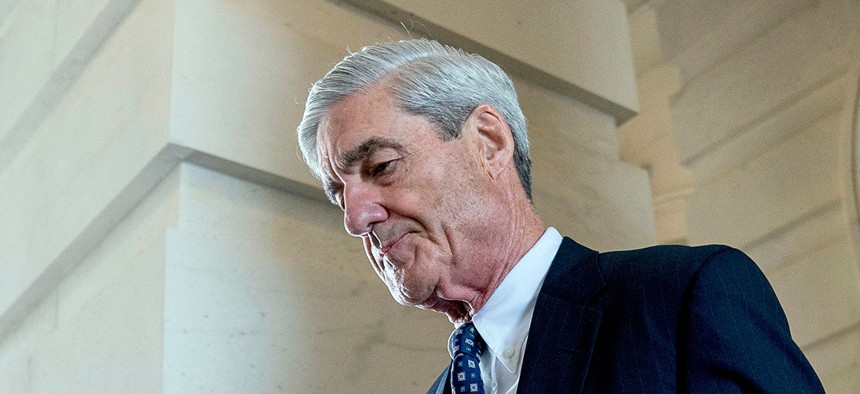Trump May Be Considering Firing The Head Of The Russia Probe. Can He Do That?
He can. But it would entail a "crazy scenario."
A longtime confidante of Donald Trump said in a television interview Wednesday night that the US president was considering firing special counsel Robert Mueller, who is now leading the FBI’s probe into Russian interference in the 2016 election.
Christopher Ruddy, chief executive of Newsmax Media, had been at the White House prior to his conversation with PBS NewsHour’s Judy Woodruff, the New York Times reported.
“I think he’s considering perhaps terminating the special counsel,” Ruddy said. “I think he’s weighing that option.”
Conservative news outlets have been working hard to discredit Mueller in recent days, citing what Fox News’ Sean Hannity called his “massive conflict of interest”—a friendship with fired FBI director James Comey.
Hard to imagine Trump fires Mueller, but right-wing media is laying groundwork. Breitbart, Drudge, Hannity. pic.twitter.com/8ZsXS5ehi4
— Will Sommer (@willsommer) June 13, 2017
Can Trump fire special counsel Robert Mueller?
Could the president get rid of the independent counsel leading the Russia investigation? In short—yes, but only through what Lawfare called a “crazy scenario.”
Trump would either have to order deputy attorney general Rod Rosenstein to fire Mueller, or alternatively, repeal a set of 18-year-old regulations protecting the special counsel.
Speaking at a Senate appropriations subcommittee hearing today (June 13), Rosenstein confirmed Trump could not legally outright fire Mueller himself, and assured senators that the Justice Department has given Mueller the “full independence he needs to conduct that investigation.”
The special counsel can only be fired for “good cause,” and Rosenstein himself would have to put that justification in writing, he said.
Attorney general Jeff Sessions has already recused himself from the Russia matter, leaving the personnel oversight to Rosenstein on this issue.
Should Trump want to go around the department, the president would need to repeal the regulations enacted in 1999 that protect the special counsel from being summarily dismissed.
As former acting solicitor general Neal Katyal wrote in the Washington Post:
The president, therefore, would have to direct Rosenstein to fire Mueller — or, somewhat more extravagantly, Trump could order the special-counsel regulations repealed and then fire Mueller himself.
Either of those actions was unthinkable to us back in 1999, for we understood that President Richard Nixon’s attempt in this regard ultimately led to his downfall. At the same time, after Trump’s firing of FBI Director James B. Comey this month, many things once thought beyond the realm of possibility look less so now.
Could Rosenstein’s job also be in jeopardy?
As Rosenstein said in the Senate hearing, he believes Mueller’s team has both the independence and resources necessary to conduct the ongoing probe. And Rosenstein said Mueller could not be fired without his personal assent. Unless there was sufficient reason to fire Mueller, he offered, “it wouldn’t matter what anybody said.”
Yet during the hearing, Sen. Joe Manchin of West Virginia asked a question that perhaps alludes to the potential precariousnesses of the deputy attorney general’s own position in the administration:
“Can you be fired without cause?”, Manchin asked.
“Yes,” Rosenstein said.
“And who appoints your replacement?”
“The president.”
“So that’s a possibility.”
“Anything’s possible, senator.”



